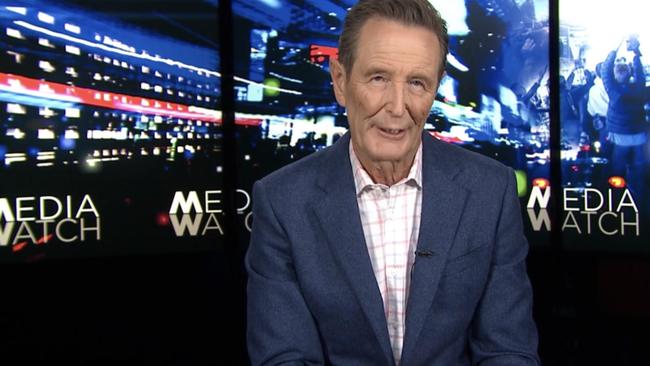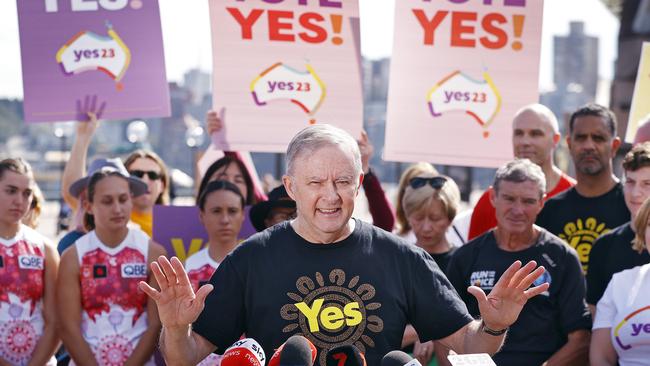Peta Credlin: Increasing number of hurdles trying to prevent No campaigners for the Voice being heard
The ABC decision to issue staff with advice on how to handle Voice disinformation is just the latest example of the bias that “No” advocates will face as the campaign formally kicks off, writes Peta Credlin.
Opinion
Don't miss out on the headlines from Opinion. Followed categories will be added to My News.
In a rare departure from political correctness, last week, the ABC’s Media Watch programme acknowledged that maybe, perhaps, the Uluru Statement might be more than just one page and that the referendum might be about more than just listening to Aboriginal people before making decisions for them.
Which of course, it is. That’s why they didn’t want you to know what is in the full document.
Analysing whether Facebook was justified in blocking an editorial of mine as “False information. Checked by independent fact-checkers,” ABC host Paul Barry conceded that while “the Uluru Statement is expressed on one page … there are many more pages of notes and background … where matters like a treaty and reparations are raised”.
Perhaps through gritted teeth, Barry said: “given that there may be some point in what Credlin is saying” Facebook might have labelled it “disputed” and should not have blacked out my Sky News declaration that the Uluru Statement was actually a 26-page ambit claim against the Australian people.
This rare outbreak of balance at the national broadcaster lasted scarcely 48 hours before senior management reportedly distributed advice to staff “on how to handle misinformation in an interview”.

That advice cited former 7.30 Report presenter Leigh Sales, who stated that the Uluru Statement was indeed only one page, that the rest of it was just the “minutes from meetings” leading up to it, and that if anyone suggested that the Uluru Statement might exceed one page, the interviewer was to step in to correct any such claim; because, Sales said, ABC “journalists should not be afraid to stand up for the facts”.
Even “facts” that had been publicly contradicted, at least seven times, by Statement architect Professor Megan Davis, before the Statement’s length and contents became an issue, and which had been called “disputed” just days earlier by the ABC’s own Media Watch. Give me a break! Talk about activist journalism.
And this is just the latest example of the bias that “No” advocates will face as the Voice campaign formally kicks off this week.
On top of all that’s happened so far, starting with the attempt to avoid sending a for-and-against booklet to each household, the refusal to have a constitutional convention, the refusal to fund both sides of the argument, and the delay for months in giving the same tax deductibility to both sides.
As seen last week, even the once scrupulously impartial Australian Electoral Commission seems to be invested in a Yes win, by counting ticks as formal votes in favour but not crosses as formal votes against; when surely, if someone can’t manage something as simple as writing “yes” or “no”, it has to be an informal vote.
And then there’s the growing evidence that Big Tech is trying to rig the outcome by consistently describing arguments against the Voice as “misinformation”.
With Big Tech, Big Business, Big Sport and even Big Philanthropy all barracking for the Voice , there’ll be an avalanche of money to try to force you to vote Yes, insisting that a constitutionally entrenched Indigenous Voice is nothing but a modest change, and to say “no” would be disrespectful to Aboriginal people.
The great unknown is the extent to which big money, rather than a strong argument, can swing something as important as changing the way government works and how citizens have their say.

Make no mistake, this referendum on the establishment of a constitutionally entrenched Indigenous Voice is not just about recognising Aboriginal people were here first. It’s about accepting that Aboriginal people were so fundamentally wronged by British settlement that now, two centuries on, they deserve a special say on anything significant that government has to deal with.
And it’s about starting the process of treaties between Aboriginal and non-Aboriginal Australians, with billions in compensation to come.
It’s going to be a knock-down fight because it boils down to the sort of country we think we’re living in. Is Australia today a country we can be proud of? Or is there a crime at the start of our national existence that has to be atoned for, and do we do that by dividing citizens by their race?
Voice proponents, from the PM down, want to harness the undoubted goodwill towards Aboriginal people to get voters to agree, in a short, sharp campaign, to something we will regret on reflection.
That’s why the continuing fight over the Uluru Statement matters.
If it’s just a benign invitation for all Australians to walk together down the path of reconciliation, the PM reckons his legacy project still has a chance, despite its falling polls.
But if voters understand the Uluru Statement is all about Treaty and Truth, and the Voice is just a vehicle to bring on further change, no amount of celebrity endorsements (and taxpayer millions) will save his signature policy.
Big Tech justifies its selective approach to “misinformation” by claiming it only blocks material judged false by accredited “fact-checkers”. But last week, my Sky colleague Jack Houghton exposed what appears to be its rank one-sidedness. Of the 17 Voice posts that Facebook has recently blocked because so-called fact-checkers regarded them as false or misleading, all have been arguments against the Voice and none for it, even though the Yes campaign has been loose with the truth. As reported on Sky, Facebook claims it only blocks posts fact-checked by an independent entity. Yet it turns out the RMIT fact-checkers, on whose say-so Facebook has been blocking arguments against the Voice (including my own), are funded to the tune of up to $740,000 a year by a Facebook-related entity.
And this RMIT FactLab is no longer certified by the “International Fact Checking Network” that is supposed to supervise and validate Facebook’s arbiters of truth on the internet.
What’s more, the head of RMIT’s FactLab, Russell Skelton, a former ABC journalist, has been personally re-posting pro-Voice material, including tweets by Indigenous Affairs Minister Linda Burney, despite Facebook claiming that its “independent” fact-checkers don’t “advocate for or against any policy positions”.
Another RMIT fact-checker, who’s also helped to block Sky’s page, Renee Davidson, recently labelled Opposition Leader Peter Dutton a “fear-mongering racist”.
Facebook can’t distance itself from these fact-checkers because it’s the social media giant that keeps blocking material based on their work.
Also last week, after fact-checking became an issue, the ABC contacted The Australian (where I am also a columnist) to deny that the national broadcaster had anything to do with the RMIT FactLab that labelled my first Voice editorial “misinformation”.
Yet the RMIT FactLab’s page stated it “works hand-in-hand with RMIT ABC Fact Check – a partnership between RMIT University and the ABC that focuses on fact-checking claims by public figures”. Skelton, the RMIT website said, was the director of both fact-checking entities.
As of last Friday, the FactLab site had been cleansed of any reference to the ABC and Skelton. As The Australian’s Sophie Ellsworth reported, it explained that “we’re always updating our website … to keep up with the rapidly changing media landscape”.
On Saturday 14 October, your vote will be as much about free speech and what sort of transparency you will tolerate from your government as it will be about dividing Australians by race. It is that serious.
WATCH PETA ON CREDLIN ON SKY NEWS, WEEKNIGHT AT 6PM





